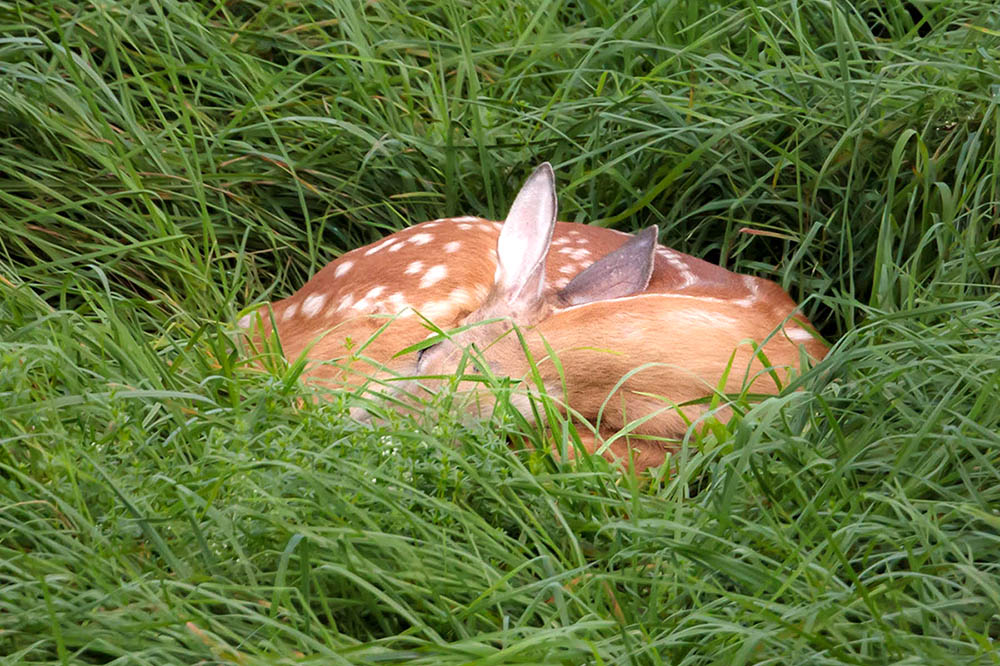Episode 161: Hemp Hangups; Living With Lyme

Cornucopia owner Nate Clifford talks about a CBD product with a customer. (Robin Lubbock/WBUR)
This week on NEXT:
Hemp is big business! Farmers are growing it, stores are selling its extract, CBD, and some people are even smoking it. But big expectations for the crop are being tempered by regulatory concerns.
We’ll consider our love-hate relationship with deer.
Plus, we’ll go inside the body to understand the little bacteria that causes the big problem called Lyme Disease.
And, we’ll explore a new type of football–eight-man football.
The Boom of Hemp Business

At Shop Therapy in Northampton, with new regulations on CBD products coming soon, edibles are on sale. (Robin Lubbock/WBUR)
We’ve reported on the big business of legal marijuana in some New England states, and the legislative fights over legalization in others. But we’re going to focus today on another crop – hemp – that’s legal to grow in most of our region and is attracting new advocates, on the farm and in state government.
Connecticut’s Commissioner of Agriculture Bryan Hurlburt says the state’s pilot program signed up 66 licensed growers this year and it’s taking the place of another controversial crop that’s long been a staple of the Connecticut River Valley, tobacco.
In Vermont, some 450 farmers planted hemp this year. But in Massachusetts, some farmers and retailers find themselves in limbo, as a new state policy takes effect in different ways in communities. It’s a ban on the sale of some hemp products, including foods with the cannabis extract “C-B-D.”
WBUR’s Zeninjor Enwemeka looks at how those affected are reacting.
While hemp growers, and CBD sellers, are awaiting more clarity on the future of their business, there’s another twist to the hemp boom. While marijuana contains the psychoactive substance THC, and hemp is marijuana’s non-psychoactive relative, increasingly, people are smoking hemp buds in the same way Americans have smoked marijuana buds for a hundred years.
VPR’s Emily Corwin brings us the story.
Exploring Lyme Disease

Since it was first “discovered” in the 1970s, the tick-borne disease named after a town in Connecticut has been a scourge of people who love the outdoors. Lyme Disease is carried by black-legged – or deer ticks, and affects about 300,000 people nationwide, according to the CDC. Although it’s spread down the eastern seaboard and is found in the midwest, Lyme’s highest concentrations are in New England.
The new podcast from NHPR, Patient Zero, explores this enigmatic disease from its discovery to the controversy surrounding its treatment.
Too Many Deer?

White-tailed deer. Photo by Tig Tillinghast
Despite Lyme Disease being carried by “deer ticks” – research over the last decade suggests that more deer doesn’t necessarily mean more Lyme. Studies from both Harvard and the University of Oslo in Norway suggest that the spread of the disease isn’t linked to a booming deer population.
But that boom is causing other problems. Across the eastern U.S., white-tailed deer are changing the composition and structure of our forest ecosystems. To be fair, they’re not alone. Climate change, insects and pathogens, invasive species these are all stressors that contribute to the problem. But deer are, arguably, the bluntest instrument of change.
Producer Erica Heilman examines the issue from all sides in The Resilient Forest series produced by Northern Woodlands Magazine.
Are You Ready For Some Eight Man Football?

Assistant coach Jon Gallant, in the background, watches as players run drills at Old Orchard Beach’s first football practice of the season Monday morning. Shawn Patrick Ouellette_Staff Photographer
One of the recurring themes of our coverage of New England over these last few years has been the aging of our population, and the shrinking of many communities. That’s meant school consolidations and closures in some places that just don’t have enough school-age students.
It’s also changing the landscape of scholastic sports – at least in Maine – where this football season kicked off with 10 schools competing with a new type of game – eight-man football. Steve Craig is a sportswriter for the Portland Press Herald, and he’s been covering this change.
About NEXT
NEXT is produced at Connecticut Public Radio
Host: John Dankosky
Producer: Robyn Doyon-Aitken
Digital Producer: Carlos Mejia
Senior Director: Catie Talarski
Music: Todd Merrell, “New England” by Goodnight Blue Moon, “Moonshine” by Billy Wylder
